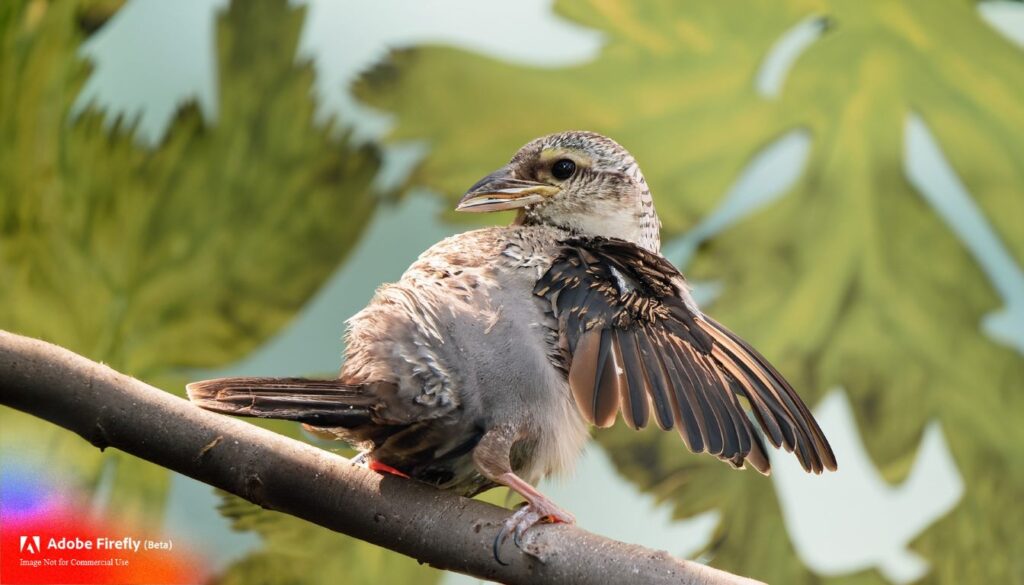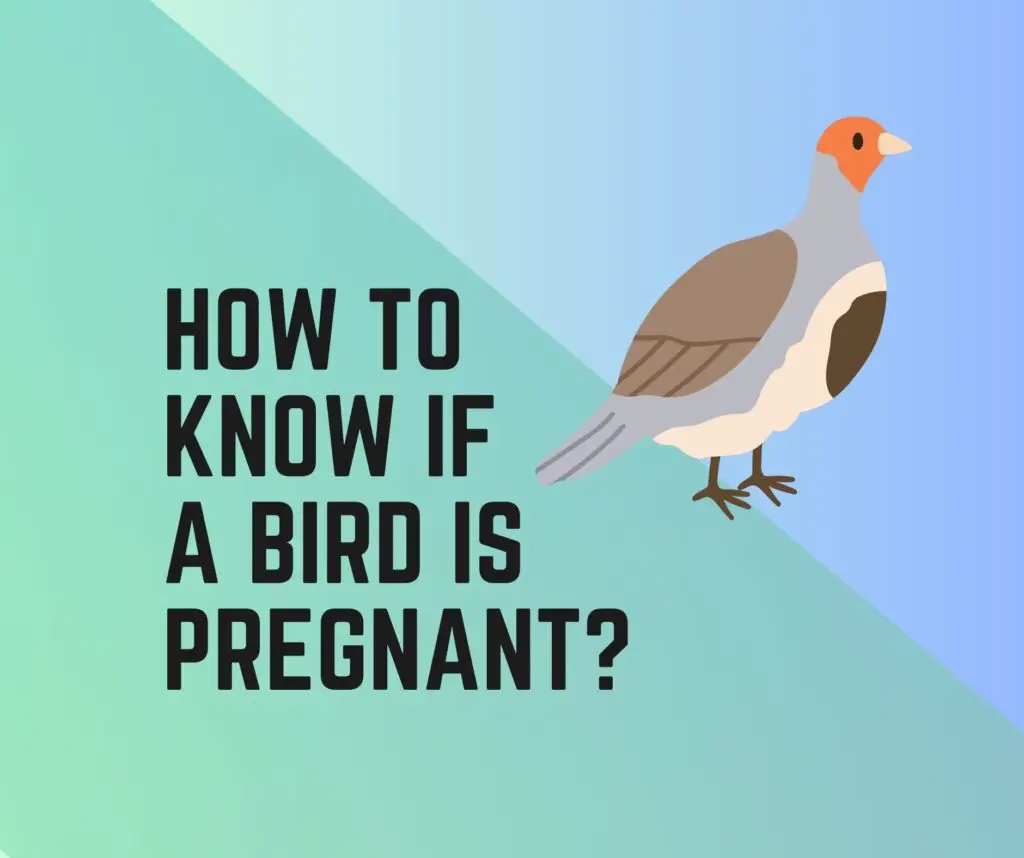Enter the beautiful world of birds, where we will learn about Avian Pregnancy and the subtle art of identifying the same. Just like humans, our bird friends exhibit intriguing changes during this special time. This article is your guide to unveiling these secrets, helping you navigate the signs and signals for finding out if your bird is pregnant.
Have you ever wondered if your chirpy companion is about to become a parent? From their unique vocalization to nesting behaviour, physical transformation, and more, it requires a blend of observation and understanding to identify pregnancy in birds. But there is no complex jargon here – we’re all about straightforward insights.
Whether you’re a seasoned bird keeper or a curious novice, join us on this educational voyage.
12 Signs to Identify If a Bird is Pregnant
Identifying whether a bird is pregnant or not requires a close connection with the feathered buddy. It involves keen observation since birds’ pregnancy differs from that in humans and other mammals. However, birds exhibit some physical changes and behavioural changes that add to the club.
Here are some common signs that will help you identify whether your bird is pregnant:
- Look for Behavioral Changes: Keep an eye out for altered behaviours in your bird. While pregnant, some birds become quiet, some agitated, whereas others become territorial.
- Monitor their Nesting Behavior: While pregnant, some birds start collecting nesting materials, rearrange their nest’s environment, and spend more time in their nest. Birds do so to prepare for laying eggs.
- Look for Physical Changes/ Transformations: Observe changes in weight, especially near the abdomen area of the bird. Also, some birds develop a more prominent or swollen vent area.
- Observe if the bird is Egg Laying: Egg laying is the birds’ most definitive sign of pregnancy. You can also consult an avian specialist to understand the typical egg-laying patterns of your bird’s species.
- Observe changes in Birds’ Appetite: Just like in humans, pregnant birds might have changes in appetite. They may either eat less or more.
- Listen for altered Vocalizations: Some birds become more vocal during pregnancy, while others might become quieter.
- Check their Cere’s Color: In birds, the cere (the area above the beak) can change colour during pregnancy. While male birds usually have blue cere, it turns brown and crusty in females.
- Mating: Birds who are frequently engaging in mating behaviour (courtship dances and regurgitating food) may be preparing for breeding. This could be one prominent sign that the bird will become pregnant in a few days. Keep an eye on them.
- Check if their Poop is Larger: Due to hormonal changes regarding pregnancy and egg production, some birds poop larger droppings.
- Bird Staying at the Bottom of the Cage: Female birds who spend more time on the cage floor than usual may be pregnant. They typically do so as a sign of discomfort, which can occur when she’s preparing to lay eggs.
- Weight Gain: Not similar to that of mammals, but pregnant birds may experience slight weight gain due to the physical changes associated with egg development.
- Swelling Vent: If your bird has a swollen vent (external opening for the reproductive and digestive systems), it indicates an impending egg-laying process.
However, all the above signs can vary depending on the bird species, age, and other factors. If you are still unsure, you can contact a veterinarian experienced in avian care. The professional can confirm pregnancy after performing a physical examination.
Pregnant and Breeding Birds’ Checklist
Having a checklist handy when dealing with pregnant and breeding birds can be incredibly helpful. Here, we have prepared everything that you need to know and be prepared for:
- Keep a check on birds’ behaviour, including courtship displays, vocalization changes, increased territoriality, changes in hunger and more. Also, monitor their behaviour of regurgitation and feeding each other.
- Note any changes in the core colour (for species where this is applicable).
- Check if the bird spends more time near or inside a breeding box or nesting area.
- Pay attention to their vent area for swelling.
- Prepare a suitable nesting box or area with proper nesting materials. Also, observe their behaviour of nesting/ spending more time inside the box.
- If the bird is pregnant, adjust its diet with calcium-rich food since egg production can deplete calcium reserves. Ensure a balanced and nutritious diet.
- Prepare a stress-free environment for breeding. Add privacy-minimizing disturbances.
- Once the bird is pregnant, schedule regular veterinary check-ups for their overall healthy body. Discuss dietary changes and any necessary supplements with the vet.
- Learn about the typical egg-laying patterns for the bird species you’re working with. Also, do try to understand the incubation period and conditions required for successful egg development.
- Make sure you are ready for the potential chicks and have essential supplies like a brooder, a plan for hand-rearing (if needed), and more.
- At last, learn about emergency steps if complications arise during breeding or egg-laying.

For How Long Does A Bird Stay Pregnant?
Birds do experience pregnancy, but not in a similar way as mammals. Birds lay eggs and then incubate externally, unlike mammals, which carry the developing embryos internally.
The time when birds lay eggs and hatch is termed the Incubation Period. On average, Birds’ Incubation Period can range from 10 to 28 days through, largely depending upon the species. There can be some exceptions, though. For instance, birds like eagles and albatrosses (typically larger avians) incubate for several weeks. At the same time, tiny songbirds incubate for 10 to 14 days or maybe less.
Overall, it is important to learn that birds’ pregnancy is very different from that of mammals (humans and other animals). The concept of mammal pregnancy doesn’t apply to birds since their reproductive process is unique. Birds lay eggs and do not birth a chick as a whole. Therefore, instead of a pregnancy period, birds go through a process of egg development and incubation.
Do Birds Look Pregnant?
No, birds don’t exhibit visible signs of pregnancy as humans do. Their reproductive process involves laying eggs externally rather than carrying embryos internally.
However, some behavioural and physical changes can indicate that a bird is preparing to lay eggs or is in the breeding phase.
Bottom Line…
Overall, determining if a bird is pregnant is unlike spotting pregnancy in mammals. Pregnancy signs in birds aren’t typically visible since they lay eggs externally. However, some indications include signs like nesting habits, physical cues, and behaviour shifts.

Hi, There and Welcome to BirdsNews.com, is here to help you learn and care about pet birds. and this blog is a journal of everything I’ve learned.

